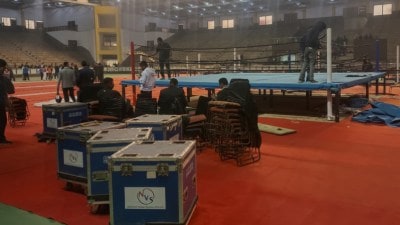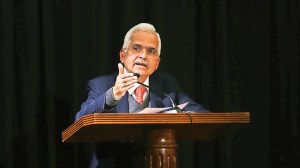Tamil needed to be honoured
It's fabulous news that Tamil will finally get its due. But meanwhile, the most-quoted person these days in the universe of discourse must b...

It8217;s fabulous news that Tamil will finally get its due. But meanwhile, the most-quoted person these days in the universe of discourse must be George L. Hart, professor of Tamil since 1975 at the University of California in Berkeley and holder of the Chair in Tamil Studies. He took his degree in Sanskrit at Harvard and also knows classical Greek, Latin, Russian, German, French and Malayalam, besides having a good acquaintance with Telugu and Hindi directly and all the other literatures of South Asia in translation.
In his famous 8216;Statement on the Status of Tamil as a Classical Language8217; way back on April 11, 2000, Hart concludes with asperity: 8220;It seems strange to me that I should have to write an essay such as this claiming that Tamil is a classical literature 8212; it is akin to claiming that India is a great country or Hinduism is one of world8217;s great religions. The status of Tamil as one of the great classical languages of the world is patently obvious to anyone who knows the subject. To deny that Tamil is a classical language is to deny a vital and central part of the greatness and richness of Indian culture.8221;
Most of us in India can8217;t seem to see the wood for the trees, because we have overdosed on coalition politics and regional tussles. But the issue of Tamil8217;s classical status goes well beyond the DMK or Karunanidhi8217;s crusading. Tamil8217;s antiquity is a fact, it is an incontestable truth. In Sanskrit you8217;d say it is 8216;sat8217;, whose powerful and absolute meaning is 8216;that which is8217;. Tamil8217;s status simply is. Recognising and proclaiming it does not in any way diminish the beauty and lustre of any of our mother tongues, nor does it demean any other regional culture.
Do you see champions of young but proud languages like French, German or Italian going berserk because Greek is recognised and honoured as the classical language of Europe? On the contrary, they celebrate their links with this older tradition and each country teaches it as a civilisational treasure. Considering that India is rather like a 8216;United States of Europe8217; and the European Union is seriously studying our Constitution for pointers on how to manage itself, surely it is a matter of great civilisational pride for all Indians that no other country in the world can boast of two classical languages, Sanskrit and Tamil, sprung from its own soil?
Since the world8217;s club of classical languages is very small and select 8212;Tamil, Sanskrit, Greek, Latin, Chinese and Hebrew, with Arabic and Persian as later additions 8212; what exactly is a classical language? It seems best to go back to Professor Hart, since we have nobody here in India of his qualifications we did until three generations ago; the only well-known one who comes close today is Dr Raja Ramanna 8212; another matter to ponder altogether. Says Hart: 8220;To qualify as a classical tradition, a language must fit several criteria: it should be ancient, it should be an independent tradition that arose mostly on its own, not as an offshoot of another tradition, and it must have a large and extremely rich body of ancient literature. Unlike the other modern Indian languages of India, Tamil meets each of these requirements. It is extremely old as old as Latin and older than Arabic; it arose as an entirely independent tradition, with almost no influence from Sanskrit or other languages; and its ancient literature is indescribably vast and rich.8221; In addition, Tamil influenced the South-Eastern languages it met as far as Thai, which derives its script from Tamil characters.
It is premature here to speculate on what 8216;classical8217; means in terms of funding and new institutional muscle. But even beyond Tamil politics and shared Indian pride, it means dropping that big banana chip from our shoulder and liberating ourselves to experience the sheer joy of learning as a rightful human need. The neo-Dravs need to drop their fear of 8216;Sanskritists8217; and invite the best minds in the country to enter the rich world of Tamil, saying, 8220;It is as much yours as ours.8221; The rest of India is too sensible to grudge this resplendent mother tongue her place of honour: obviously all of us are enriched when one of us lifts her head. Above all, a classical education has got to co-exist honourably with the need to spread primary education and vocational training. How is it 8216;elitist8217; to want to learn our own heritage?
- 01
- 02
- 03
- 04
- 05































